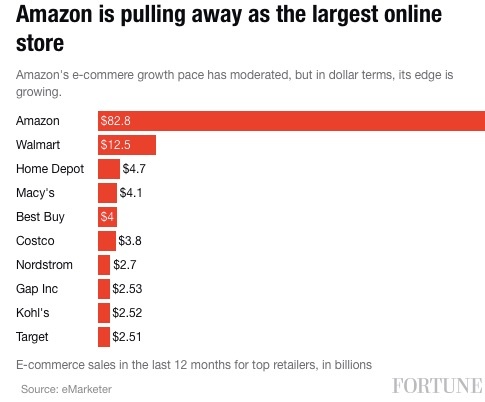Let’s face it: Amazon Business is crushing it. Whether it be doing over $1 Billion in revenue in its first year of operation, or winning a $5.5 Billion public sector contract, Amazon is setting the standard for B2B procurement in the same way it did for B2C procurement.
In the B2C world, the results are black and white: Amazon is winning, and winning big.

B2B distributors and retailers should learn from history. Every B2B organization is facing the prospect of change.
- How do we satisfy buyers who want direct access to more products, with low prices, and strong customer service?
- How do we embrace the promise of B2B e-commerce without disrupting our supply chain?
Amazon is winning, thanks to a B2B Marketplace
Today, CEOs at B2B organizations have added a new question to this list, wondering, “how do we compete with Amazon?”
This is due to the fact that Amazon Business is rapidly growing. Amazon has used the Marketplace model to establish itself as the gold standard in terms of customer experience. It is now the norm in B2C eCommerce, and quickly becoming so in B2B as well.
Why? Because it ended the short life of Amazon Supply - the B2B eCommerce site launched in 2012 where the products were all listed, stored, and marketed by Amazon - and replaced it with Amazon Business, an exact replica of Amazon.com in terms of user experience. Buyers have an interface and purchasing process in line with what they are used to as private purchasers, while also benefitting from additional features specific to B2B needs (multi-user account, access to the order history, reports, modules connecting to e-procurement tools, etc.). Thus, the B2B crowd reaps the benefits of the virtuous cycle created by the marketplace model.
Meet the changing demands of the B2B buyer
B2B buyers are changing the rules of the game by conducting their research and purchasing online. A Marketplace helps B2B organizations rise to meet these demands:
- It is the best mechanism to expand product assortment risk-free.
- It incorporates a community of sellers that bring flexibility and agility to the B2B eCommerce process.
- It takes traditional assortment expansions mechanisms like drop-shipping to new, more agile and scalable levels.
B2B Marketplaces are not just for retailers. Distributors and manufacturers cannot ignore this revolution either, especially when faced with the growing power of Amazon.
Learn more about Mirakl for B2B companies, and how you can start to compete with Amazon without introducing risk to your organization.Topics : Marketplaces B2B eCommerce Amazon

Written by Barry Murphy
Barry Murphy is the Director of Content and Product Marketing at Mirakl. In this role, Barry leads the alignment of Mirakl's offerings to market needs for the next generation of online commerce. Barry previously ran product marketing organizations for X1 and Mimosa Systems (now part of HPE). Barry also had a highly successful stint as Principal Analyst at Forrester Research. Barry received a B.S. from the State University of New York at Binghamton and an M.B.A from the University of Notre Dame.
